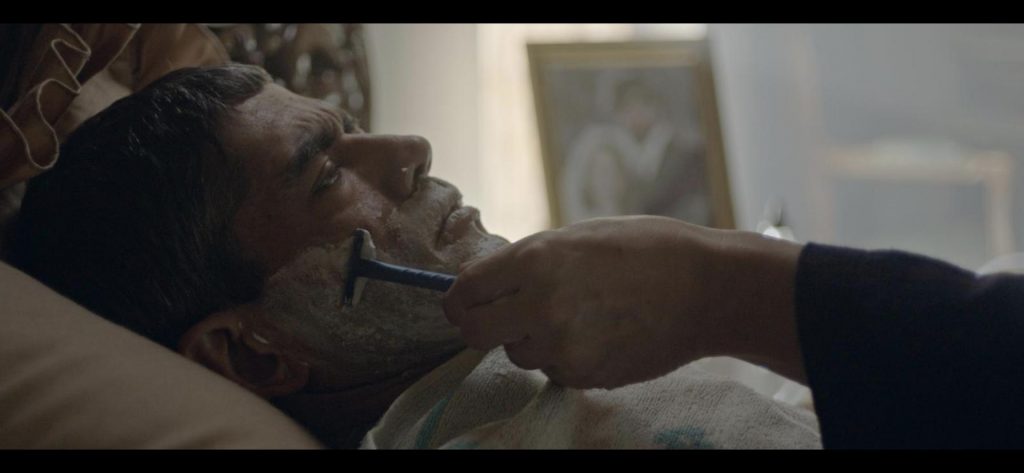The glum seasonal comeback rom-com to gory Yuletide horrors (including this weekend’s “Violent Night” and “Christmas Bloody Christmas”) are this year’s fresh contributions to what has practically become its genre. No matter how dyspeptic in spirit they may be, everyone seems to hold on to a certain sweetness, assuring viewers that they don’t aim to spoil anyone’s holiday pleasure.
“Amigo,” the first film that Oscar Martin has directed, has none of that. Javier Botet and David Pareja, the film’s leads and co-writers, masterfully transfer their on-screen relationship to this macabre dramatic setting. This chilly Spanish psychological thriller had its world debut at Fantastic Fest more than three years ago, and it concludes with a New Year’s Eve that may be some characters’ final. Fans of controlled, intimate, yet terrifying tension will find that the long wait for its North American release was worthwhile. Dekanalog will debut in a few U.S. cinemas on December 2; home formats will follow early in 2019.
As David (Pareja) brings Javi (Botel) home to his isolated farmhouse, seemingly straight from the hospital, the situation starts in a subdued uncomfortable manner. Javi is confined to an upper bedroom and is hardly able to speak or move. We see his scar-covered, skin-tight physique as David baths him. It takes some time to sink in that his condition is the result of a vehicle accident that killed Javi’s wife and for which David was clearly at fault.
While Javi has limited options for resistance (like refusing to eat), David makes an effort to adopt a posture of nursemaid kindness while disregarding the few words of stinging rebuke he can utter. Visits from a chatty physiotherapist (Patricia Estremera) brighten the mood overall. But as time goes on, snowstorms make the nearby roads unusable, completing the isolation of the pair. Additionally, David’s supply of prescription medication was cut off, which greatly disturbed him. When David stops taking his medication, he becomes more prone to paranoia, hallucinations, and troubling mood swings, so soon Javi will find it disturbing as well.
The fundamental idea of an insane caregiver holding a defenseless ill hostage immediately brings to mind “Misery” and “What Ever Happened to Baby Jane?” However, “Amigo” more closely resembles films like Polanski’s “Repulsion” with its eerie stillness, sparse language, and matter-of-fact blurring between truth and illusion in its meticulous audiovisual representation of fading sanity.
David sets a camera to watch Javi’s imagined movements because he is irrationally certain that Javi is secretly walking around the home (although he hardly has the strength to fit a rubber ducky in the tub). What Javi, who is bedridden, really watches in his room is consistent with what he thinks he sees on his TV monitor: old Spanish horror films and TV series. To emphasize the perversity of our heroes’ forced, uncomfortable “togetherness,” there are also saccharine Christmas ads.
We never discover the exact details of that tragic vehicle accident, therefore the writing may be more obtuse than required. The two men’s primary relationship is also never entirely explained; early pictures show them to be brothers or at the very least lifelong acquaintances, but no history is provided. Such information may have enhanced a narrative that, in the end, feels a little undernourished for feature-length treatment.
Nevertheless, “Amigo” makes a lot of use of its straightforward premise. Even though it’s a purposefully slow burn, it never loses interest as suspense is built up for two audaciously extended shots that take place in dire life-or-death situations. In other scenes, Alberto Morago Munoz’s widescreen compositions make the unremarkable country surroundings look quite attractive and give the rooms a lot of ambiances. Manu Conde composed very powerful, expressive original music.
In addition to significant parts in the “[REC], “Insidious,” “Conjuring,” and “It” series, Botet has been cast in various “monster” roles due to his emaciated physique (he was born with the genetic illness Marfan syndrome). Here, he uses that to create a figure of tangible vulnerability while still maintaining an eerie edge, making it much more accessible. He frequently collaborates with Pareja on sketch comedy projects (most notably online videos and short films), and Pareja is excellent as a repentant buddy who becomes a victim, even if the character’s mental problems are kept vaguely explained.
